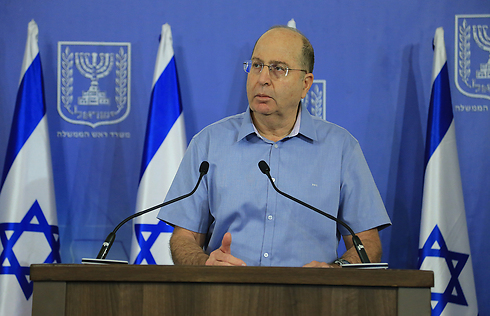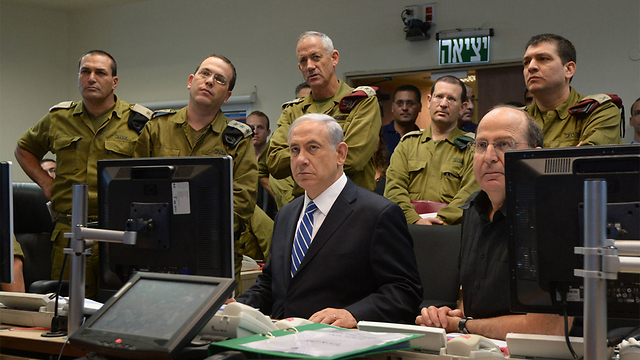
Ya'alon: Operation Brother's Keeper led to Gaza escalation in 2014
The former defense minister believes it was the arrest of about 50 released prisoners from the Shalit deal, along with hundreds of other Palestinians in the West Bank, which caused Hamas to quickly accelerate the situation, leading to Operation Protective Edge.
Former defense minister Moshe Ya'alon believes that the widespread Operation Brother's Keeper to re-arrest 50 of the prisoners released in the Shalit deal, along with hundreds of other Palestinians in the West Bank, during the search for three Israeli teens kidnapped by Hamas was what led to the escalation in the Gaza Strip that resulted in Operation Protective Edge.
On June 14, 2014, two days after yeshiva students Eyal Yifrach, Naftali Frenkel, and Gil-Ad Shaer were kidnapped in Gush Etzion, the cabinet convened for an emergency meeting. At that point, the ministers already knew with certainty that the missing teenagers had been kidnapped and that Hamas was behind the abduction.
Minister Naftali Bennett demanded that night to launch an extensive operation to arrest many of the terrorists released in the prisoner exchange for IDF soldier Gilad Shalit.

According to different reports, it was then-MK Orit Strook from Bennett's Bayit Yehudi party that approached him and suggested the idea.
But not everyone were on board: Then-defense minister Moshe Ya'alon led the opposition to the move.
Bennett persisted, claiming the move could restore Israel's deterrence. Just as he was in the discussions that followed on Hamas's terror tunnels, here too Bennett was in the minority, with ministers Tzipi Livni and Yair Lapid opposing the move and Prime Minister Benjamin Netanyahu on the fence.
Officials who were present during the discussion said Shin Bet director Yoram Cohen was in favor of the arrest operation as an act of deterrence.
Within the IDF, meanwhile, opinions were split on how effective such a move would be. One of the major generals at the time raised a simple question: If there is no legal reason not to arrest them, why haven't we done so until now?
Netanyahu was eventually convinced, swaying the tide in favor of Bennett. Some 400 Palestinians were arrested during Operation Brother's Keeper, about 50 of them were previously released as part of the Shalit deal.

Ya'alon believes that the arrest operation significantly affected the way events unfolded in the weeks to come. The arrest of the Shalit deal prisoners, the former defense minister believes, was one of the main reasons behind the accelerated and unplanned escalation by Hamas, which led to Operation Protective Edge in the Gaza Strip—something Israel's intelligence apparatus failed to foresee.
According to Ya'alon, the Intelligence Directorate's assessment that Hamas was not seeking an escalation in Gaza was accurate. It were the Israeli operations in the West Bank that made Hamas change direction and eventually led to the war that claimed many lives.
Ya'alon believes that if Hamas was truly interested in an escalation, the terror organization would have launched a surprise attack in the form of a deluge of rocket fire or an infiltration into Israel from several tunnels at the same time.
Preparing for the State Comptroller report dealing with the tunnel threat and the cabinet's decision-making during the operation, Ya'alon posted a video on Facebook, writing alongside it: "There are those who leak, and those who fight."
"In the coming week, you'll hear a lot about Protective Edge," Ya'alon said. "Those who dealt with politics in the cabinet during the war, in an unprecedented manner, will continue to do so this week as well. They will tell you they didn't know, that they weren't told, that they didn't receive reports. And the greatest lie of all? They'll tell you we weren't prepared and that we lost. This is nonsense."










